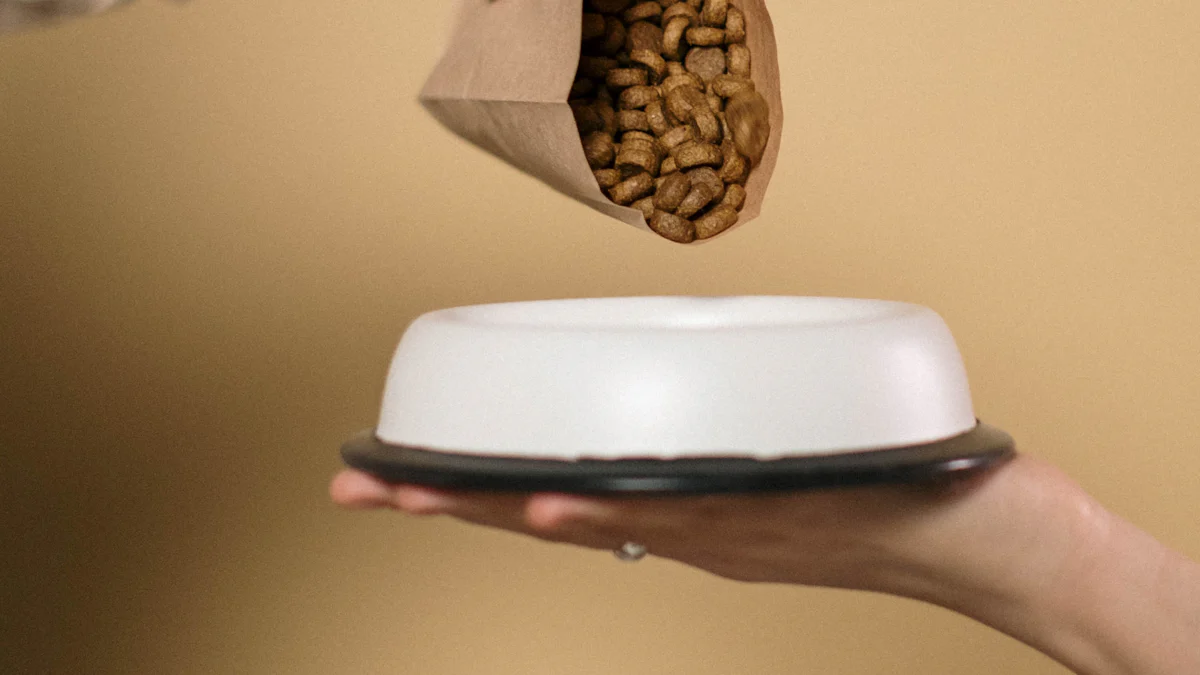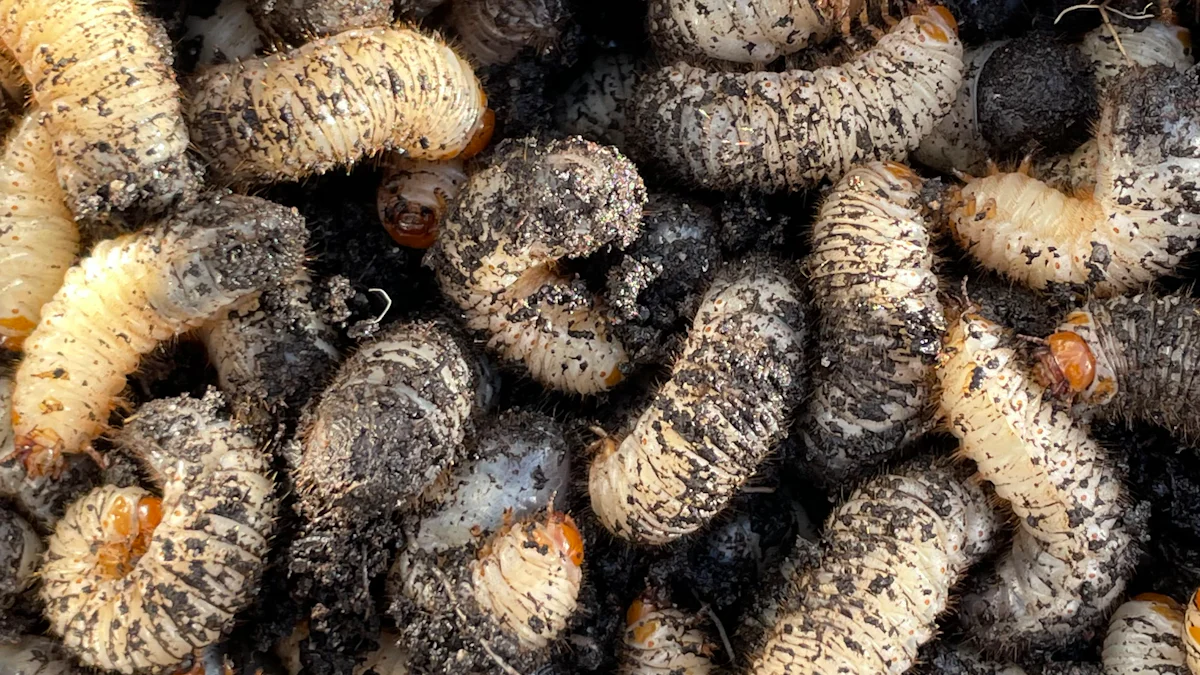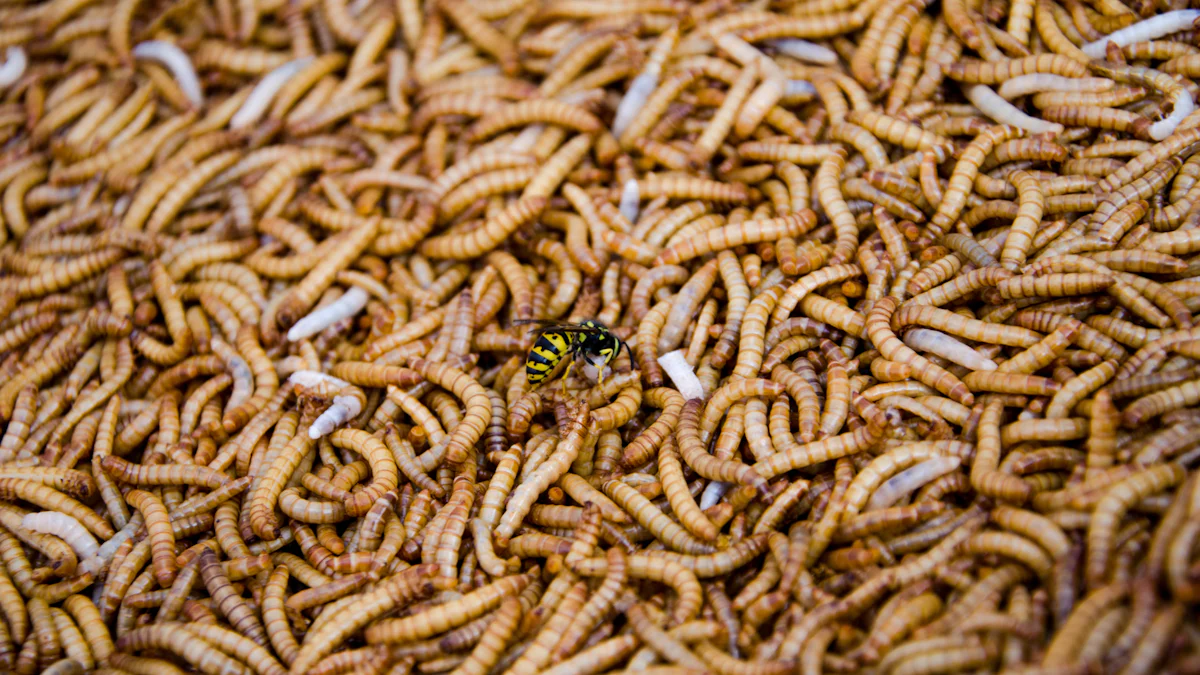
Pet owners frequently question the safety of including mealworms in dog food for their beloved pets. The reassuring news is that mealworms in dog food are indeed safe and highly nutritious. They serve as a sustainable protein source, rich in essential nutrients such as B vitamins, iron, and zinc, which contribute to overall canine health. Research indicates that diets incorporating mealworms can enhance coat quality and alleviate skin issues in dogs with sensitivities. When responsibly sourced and prepared, mealworms in dog food are not only safe but also highly beneficial. Feeding them in moderation allows dogs to reap their benefits without experiencing digestive problems.
Key Takeaways
- Mealworms are a safe and nutritious addition to dog food, providing high-quality protein and essential nutrients.
- Introduce mealworms gradually into your dog’s diet to monitor for any allergic reactions or digestive issues.
- Opt for dried mealworms over live ones for better nutrient density, convenience, and safety.
- Moderation is crucial; overfeeding mealworms can lead to digestive upset or weight gain.
- Always source mealworms from reputable suppliers to ensure safety and quality for your pet.
- Incorporating mealworms can enhance your dog’s coat health and overall well-being.
- Mealworms are an eco-friendly protein source, supporting a sustainable diet for your dog.
Are Mealworms in Dog Food Safe for Dogs?
General Safety of Mealworms
Mealworms have gained attention as a novel ingredient in pet food, leaving many dog owners curious about their safety. The good news is that mealworms are safe for dogs when sourced and prepared properly. Studies, such as the Safety Study of Dogs Fed a Mealworm-Based Diet, confirm that mealworms meet safety standards for canine consumption. This makes them a reliable option for pet food manufacturers.
Mealworms in dog food undergo strict processing to ensure they are free from harmful bacteria or contaminants. Proper preparation eliminates risks, making them a safe addition to a dog’s diet. Additionally, mealworms are not toxic to dogs, and their inclusion in pet food has been approved in various countries, including the U.S. This approval highlights their safety and nutritional value.
Addressing Common Concerns About Mealworms
Some pet owners worry about potential issues when feeding mealworms to their dogs. One common concern is whether mealworms might cause allergies. While rare, some dogs may show sensitivity to insect-based proteins. Symptoms like itching, redness, vomiting, or diarrhea could indicate an allergic reaction. Monitoring your dog’s response to new foods is essential. If any unusual symptoms appear, consulting a veterinarian is the best course of action.
Another concern involves overfeeding. Mealworms are nutrient-dense, but excessive amounts can lead to digestive upset or weight gain due to their fat content. Moderation is key to avoiding these problems. Experts recommend introducing mealworms gradually into a dog’s diet and balancing them with other food sources.
Lastly, sourcing mealworms responsibly is crucial. Poorly processed or contaminated mealworms could pose health risks. Always choose products from reputable brands that follow strict quality control measures. This ensures that the mealworms in dog food are both safe and beneficial for your furry friend.
Nutritional Benefits of Mealworms for Dogs

High-Quality Protein and Energy Source
Mealworms stand out as a premium protein source for dogs. Packed with high-quality protein, they provide essential amino acids that support muscle development and repair. According to studies like the Nutritional Value of Mealworm-Based Ingredients for Cats and Dogs from the University of Illinois, mealworms offer excellent protein digestibility, ensuring dogs can absorb and utilize these nutrients effectively. This makes them an ideal ingredient for active dogs needing sustained energy throughout the day.
Unlike traditional protein sources like chicken or beef, mealworms are also more sustainable. They require fewer resources to produce, making them an eco-friendly choice for pet food manufacturers. For dogs, this means enjoying a nutritious meal while contributing to a greener planet. Including mealworms in dog food ensures a reliable energy source, helping dogs stay active and healthy.
Rich in Healthy Fats, Vitamins, and Minerals
Mealworms are not just about protein; they are also rich in healthy fats, vitamins, and minerals. These nutrients play a vital role in maintaining a dog’s overall health. The fats in mealworms, for instance, provide a concentrated energy source and support a shiny coat and healthy skin. Research from Global Pet Industry highlights that mealworms contain essential fatty acids, which are crucial for brain function and reducing inflammation.
In addition to fats, mealworms are loaded with vitamins like B vitamins, which aid in energy metabolism and support the nervous system. Minerals such as iron and zinc, as noted in the Benefits of Feeding Mealworms to Dogs, contribute to strong immune function and healthy blood circulation. These nutrients ensure that dogs not only feel good but also look their best.
Moreover, mealworms contain natural fibers that promote digestive health. A balanced diet with mealworms can help regulate a dog’s digestion, reducing the risk of common issues like constipation. By incorporating mealworms into their diet, pet owners can provide their dogs with a nutrient-dense option that supports multiple aspects of their well-being.
Potential Risks and Precautions
Importance of Sourcing Mealworms Safely
The quality of mealworms in dog food depends heavily on how they are sourced and processed. Reputable suppliers, such as Promeal and Spryng, ensure that their mealworms meet strict safety and nutritional standards. These companies monitor every stage of the mealworm lifecycle, from farming to processing, to guarantee a premium product. This attention to detail ensures that mealworms are free from harmful contaminants like pesticides or bacteria, which could pose risks to dogs.
Pet owners should always choose mealworm products specifically formulated for pets. Brands like Ÿnsect offer mealworms tailored for the pet food industry, providing high-quality protein and essential nutrients. These products undergo rigorous testing to ensure they are safe for canine consumption. By selecting mealworms from trusted sources, dog owners can feel confident about the safety and nutritional value of their pet’s food.
When shopping for mealworm-based dog food, it’s important to read labels carefully. Look for certifications or statements that confirm the product has been tested for safety. Avoid purchasing mealworms from unknown or unverified suppliers, as poorly processed mealworms may contain harmful substances. Responsible sourcing is key to protecting your dog’s health.
Avoiding Overfeeding and Digestive Issues
While mealworms offer many nutritional benefits, overfeeding can lead to problems. Mealworms are nutrient-dense, containing high levels of protein and fat. Feeding dogs too many mealworms may cause digestive upset, such as diarrhea or vomiting. Excessive fat intake can also contribute to weight gain, which may lead to long-term health issues like obesity.
To prevent these problems, moderation is essential. Introduce mealworms gradually into your dog’s diet, starting with small amounts. Observe how your dog reacts to the new food. If your dog shows signs of discomfort, such as bloating or changes in stool, reduce the portion size or consult a veterinarian. Balancing mealworms with other food sources ensures a well-rounded diet.
Pet owners should also consider the form of mealworms they feed their dogs. Dried mealworms are a convenient option, as they are easy to store and measure. However, live mealworms may be harder to portion and could carry additional risks if not handled properly. Choosing dried mealworms from reputable brands simplifies feeding and reduces the likelihood of digestive issues.
By sourcing mealworms responsibly and feeding them in moderation, dog owners can avoid potential risks while still providing their pets with a nutritious and sustainable food option.
How to Incorporate Mealworms Into Your Dog’s Diet

Dried vs. Live Mealworms: Which is Better?
Choosing between dried and live mealworms can feel overwhelming for pet owners. Each option has its own benefits, but dried mealworms often stand out as the better choice for dogs. They offer higher protein, fat, and fiber content compared to their live counterparts. For example, dried mealworms contain approximately 53% protein, 28% fat, and 6% fiber, while live mealworms have a much higher moisture content of about 62%. This makes dried mealworms a more nutrient-dense option.
Dried mealworms are also easier to store and handle. They don’t require refrigeration or special care, unlike live mealworms, which need proper storage to stay alive. Additionally, dried mealworms are less likely to carry harmful bacteria or parasites, making them a safer option for canine consumption. Studies comparing the safety of dried and live mealworms highlight that dried mealworms undergo processing to eliminate potential contaminants, ensuring they are hygienic and ready to use.
Live mealworms, on the other hand, may appeal to dogs who enjoy the texture and movement of fresh food. However, they can be harder to portion and may introduce risks if not sourced from reputable suppliers. For most pet owners, dried mealworms provide a convenient, safe, and nutrient-rich way to include mealworms in dog food.
Practical Tips for Feeding Mealworms to Dogs
Introducing mealworms into your dog’s diet doesn’t have to be complicated. Here are some practical tips to make the process smooth and enjoyable for both you and your furry friend:
-
Start Small: Begin with a small amount of mealworms to see how your dog reacts. Gradually increase the portion size over time, ensuring your dog adjusts well to the new food.
-
Mix with Regular Food: Combine mealworms with your dog’s regular food to create a balanced meal. This helps your dog get used to the taste and texture without overwhelming their palate.
-
Choose the Right Form: Opt for dried mealworms for convenience and safety. They are easy to measure and mix into meals, reducing the risk of overfeeding.
-
Monitor Your Dog’s Reaction: Keep an eye on your dog after introducing mealworms. Look for signs of allergies or digestive issues, such as itching, vomiting, or changes in stool. If any problems arise, consult your veterinarian.
-
Use as a Treat or Supplement: Mealworms can be a great addition to your dog’s diet as a treat or supplement rather than a primary food source. This ensures your dog enjoys the nutritional benefits without overloading on calories.
-
Buy from Trusted Brands: Always purchase mealworms from reputable suppliers. Look for products specifically designed for pets, as these are processed to meet safety standards.
By following these tips, pet owners can confidently incorporate mealworms into their dog’s diet. Whether used as a treat or mixed into meals, mealworms in dog food can provide a nutritious and sustainable option for canine health.
Mealworms in dog food provide a safe and nutritious option for dogs when fed responsibly. They deliver high-quality protein, essential fatty acids, and vital vitamins and minerals that support overall canine health. Their nutrient density makes them an excellent addition to a balanced diet. Proper sourcing ensures safety, while moderation prevents potential digestive issues. Beyond their health benefits, mealworms offer a sustainable alternative to traditional protein sources. By incorporating mealworms thoughtfully, pet owners can enhance their dog’s diet while contributing to a more eco-friendly future.
FAQ
Can dogs eat mealworms?
Yes, dogs can eat mealworms. These tiny insects provide a great source of protein and healthy fats, making them a nutritious addition to a dog’s diet. Mealworms are not poisonous and don’t cause harmful side effects when fed in moderation. Many pet owners find them to be a safe and beneficial treat for their furry friends.
Are mealworms safe for dogs?
Absolutely! Mealworms are safe for dogs when sourced and prepared properly. They are packed with essential nutrients like protein, vitamins, and minerals that support overall canine health. Feeding mealworms responsibly ensures your dog enjoys their benefits without any risks.
Can mealworms cause allergies in dogs?
While rare, some dogs may show sensitivity to insect-based proteins, including mealworms. Signs of an allergic reaction might include itching, redness, vomiting, or diarrhea. If you notice any unusual symptoms after introducing mealworms, consult your veterinarian immediately.
How should I introduce mealworms into my dog’s diet?
Start small. Introduce mealworms gradually by mixing a small amount with your dog’s regular food. Observe how your dog reacts before increasing the portion size. This slow introduction helps prevent digestive upset and allows your dog to adjust to the new food.
Are dried mealworms better than live mealworms for dogs?
Dried mealworms are often the better choice for dogs. They contain more protein and nutrients compared to live mealworms, which have a high moisture content. Dried mealworms are also easier to store and handle, making them a convenient and safe option for pet owners.
Can mealworms replace traditional protein sources in dog food?
Mealworms can complement traditional protein sources but shouldn’t completely replace them. They provide high-quality protein and essential nutrients, but a balanced diet with a variety of ingredients is crucial for your dog’s health. Use mealworms as a supplement rather than the main protein source.
How often can I feed mealworms to my dog?
Moderation is key. Mealworms are nutrient-dense, so feeding them occasionally as a treat or supplement works best. Overfeeding can lead to digestive issues or weight gain due to their fat content. Stick to small portions and balance them with other food sources.
What should I look for when buying mealworms for my dog?
Always choose mealworms from reputable suppliers. Look for products specifically labeled for pets, as these undergo strict processing to ensure safety. Avoid mealworms from unknown sources, as they may carry contaminants or harmful substances.
Can mealworms help with my dog’s skin and coat health?
Yes, mealworms can improve your dog’s skin and coat. They contain healthy fats and essential fatty acids that promote a shiny coat and reduce inflammation. Many pet owners notice improvements in their dog’s appearance after incorporating mealworms into their diet.
Are mealworms environmentally friendly?
Mealworms are an eco-friendly protein source. They require fewer resources to produce compared to traditional livestock, making them a sustainable option for pet food. By choosing mealworm-based products, pet owners can support a greener planet while providing nutritious food for their dogs.


